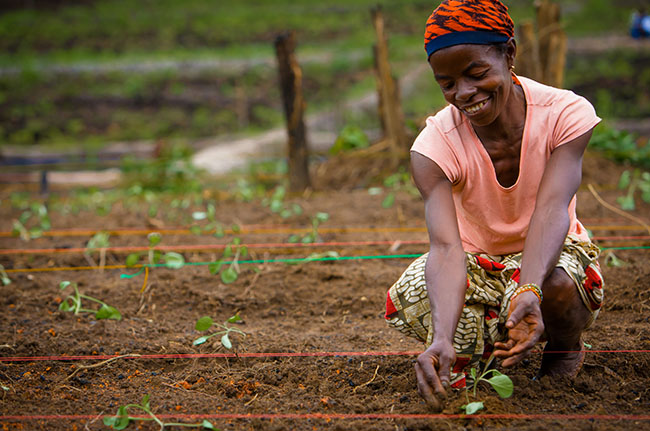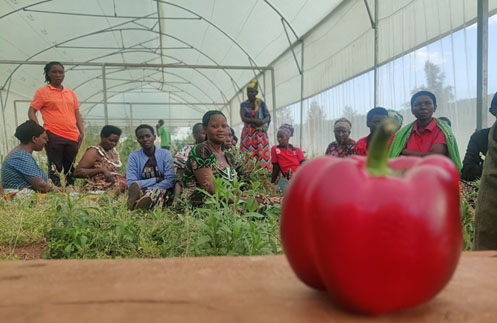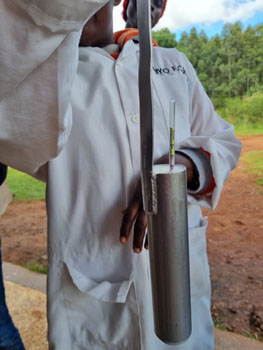Reorienting the private sector to enable climate-smart agricultural solutions to address gender inequalities

Clients
IDRC
Geography of work
Kenya, Rwanda, Tanzania, and Uganda
Sector
Gender Mainstreaming
Situation/Challenge
Agriculture remains one of the important sectors for the economic development of East Africa, contributing to more than 30% of the GDP and providing livelihood opportunities to ~80% of the region’s rural population. The sector however continues to face several challenges that hinder its growth. Small land-holding sizes, lack of good quality inputs, low productivity, poor post-harvest handling, and lack of access to sufficient credit, along with heavy reliance on rainfall, make the sector vulnerable to the effects of climate change. Furthermore, farmers lack sufficient access to information and training on good agricultural practices, which increases the cost of production. In addition to existing challenges, less-than-favorable climatic conditions such as recurrent droughts and floods, erratic rainfall patterns, rising temperatures, and water scarcity, add to the woes of the sector. However, the agriculture sector is also part of the problem as it is one of the major contributors to Greenhouse gas emissions and thus contributes to climate change.
Such effects of climate change have a huge impact on low-income populations that rely on agriculture for their livelihoods – especially women, who comprise over 50% of the agricultural workforce in East Africa. To make things worse, women in the agriculture workforce are mostly involved in lower-paying or temporary jobs or remain unpaid and hence, receive a disproportionately low share of income compared to their male counterparts. Women also have limited educational resources to build technical and digital skills, limiting their role in formal labor markets and widening gender-based financial disparities. Moreover, women face multiple socio-cultural constraints ranging from limited access to credit facilities, and lack of equal rights to land, restricted mobility, limited personal agency, and burden of care work. These systemic challenges are further exacerbated by climate change, which leads to additional issues – such as water stress and declining crop yields, which disproportionately impact women as they have a lower ability to recover from shocks.
There are several private sector-led innovative solutions and products that help the sector mitigate and/or become resilient to challenges emerging from climate change. However, increasing awareness about such solutions among farmers, structuring to suit farmer affordability, offering farmer training to ensure adoption, as well as undertaking assessments to establish their impact for the larger sector are still some areas which need further support from the ecosystem. IDRC engaged Intellecap to undertake an implementation research as part of which Intellecap launched an accelerator to support climate-smart agriculture enterprises to scale and simultaneously mainstream gender across their value chain. Through the program, Intellecap is offering customized gender-transformative technical assistance and business support each business to generate evidence for the larger sector on role of gender mainstreaming to advance low carbon development.

Solution
As part of this implementation research program, Intellecap is supporting 10 Private Sector Enterprises (PSEs) providing climate-smart solutions at the intersection of agriculture/food systems and climate change, by assisting them in using gender-transformative approaches to scale up their businesses. To this end, a preparatory research was conducted to build on existing understanding of climate-smart agriculture and its potential for gender mainstreaming and low carbon development. This led Intellecap to identify qualification criteria and minimum eligibility conditions for PSEs for the program, and subsequently launch ‘Call for applications’ to source relevant PSEs. Intellecap received over 150 applications in the first round, and an additional 30 applications in the second round of applications. Based on a pre-designed scoring mechanism (including parameters such as financial sustainability, gender diversity in employment, climate impact, and scope for gender mainstreaming, among others), 10 PSEs were finalized for the gender-focused acceleration support.
In the second phase, the team conducted in-depth data collection from the selected PSEs on their business models, customers and supply chains, HR policies and employee numbers. Intellecap then conducted field visits to witness the PSEs’ operations and conduct a needs-assessment and baseline for each PSE. Discussions were held with the senior management and staff, and FGDs with the customers, suppliers, and traders (with a focus on women value chain partners). Findings from the field helped devise a targeted Technical Assistance Plan for each PSE along with a Gender Action Plan (GAP) to keep track of activities to be undertaken by the PSE, the baseline status of each and the intended outcome. Each PSEs get 6-month long focused technical assistance support from the accelerator. Trainings included Gender 101 for business, Developing the Business Model Canvas, Marketing and market analysis, Operations management, Team management & policy review, Investment readiness training, and Financial management.
At the end of the support period, a midline assessment is conducted to assess progress on the GAP activities, identify what works well and what does not work, and suggest corrective measures for the PSE to take forward. For the next 6 months, PSEs are offered M&E and advisory support on various ongoing activities, at the end of which an endline assessment will be undertaken. Based on insights and learnings from the 12 month long engagement with each PSE, Intellecap will develop case studies to demonstrate existing and potential solutions offered by PSEs in the region for creating impact towards women’s economic empowerment (WEE) and transition to the low carbon economy. These case studies will be disseminated with the larger ecosystem to enhance knowledge of the role that climate-smart PSEs can play in improving women’s access to economic opportunities. Through such initiatives, the project also aims to create a case for channeling capital to such enterprises and highlight the need for enabling policy/incentives.
Outcome and Impact
The research is expected to create a knowledge base on gender mainstreaming in agriculture across East Africa and build a business case for investing in such climate-smart enterprises that advance low carbon development as well as WEE. The outcomes from the support program will be highlighted by way of case studies for the sector ecosystem. It will allow impact and gender lens investors to understand the financial and social impact of climate-smart PSEs and encourage them to adopt an explicit gender lens in their investment thesis. Such evidence creation will also allow ecosystem stakeholders to become more gender aware, ultimately crowding in capital towards meeting SDG targets.
Moreover, Intellecap has leveraged project learnings to conduct panel discussions on the topic at the Sankalp Africa Summits. The team has also published blogs based on findings from the research to increase awareness on solutions and enhance knowledge sharing with the ecosystem stakeholders. A blog titled “Role of climate smart agriculture enterprises in gender mainstreaming” was published to highlight PSE support needs identified by the program, how the program will help these enterprises to improve their business operations, and thus continue to play a key role in climate smart agriculture. A second blog on “Inclusive Value Chains: Experiences from gender-mainstreaming interventions” was published post the successful delivery of a panel discussion on the engagement at the Sankalp Africa Summit 2023.

Key Learnings:
FPC directors understood the value delivered by the adoption of technologies and were optimistic and eager to adopt technologies in their operations, but needed the following support:
- For gender transformation support, having a designated gender champion is instrumental in ensuring implementation of the actions and activities that improve inclusion of women in the business and drive the gender agenda for the business
- Linking women (as farmers, traders or customers) to inputs and markets by way of online platforms provides them access to high quality inputs, as well as direct access to markets and produce without going through middlemen. Such models eliminate challenges with access to capital as well as reduce vulnerabilities for women in the value chain
- Value chains, such as organic fertilizers prove to have greater potential for women’s inclusion owing to the waste segregation aspect which is traditionally undertaken by women. Building greater gender impact in these value chains may lead to increased chances of WEE
- Some agri-business models lead to reduction in production cost, which is inherently more suitable for women farmers given challenges faced in access to capital and inputs
Solution
Sometimes despite a clear focus on integrating gender in the business value chain, management may be confined by social norms and cultural barriers in the region to be able to achieve effective gender mainstreaming. Some of the social norms and cultural barriers we were exposed to during our field visits across the four countries include:
- Gender mainstreaming is merely achieving the constitutional mandate of having at least one-third of the workforce as women. Whilst this is true, we realized that this was achieved at the lower grades of the companies’ workforce. At the leadership level, there was a clear imbalance
- The agricultural workforce in East Africa is dominated by women and thus farm decisions are made by women. Our interactions with farmers revealed that while the labor at the farm is provided primarily by women, farm decisions such as how to spend the yield income, what type of crop to plant, and what type of fertilizer and inputs to apply at the farm were majorly decided by the male head of the household. In some geographies, women are only allowed to grow food crops such as vegetables for subsistence farming while cash crops are reserved for men.
- Land is largely owned by men in the four countries and passed on to male children mostly, in spite of laws in the four jurisdictions allowing equal rights for ownership of property. This inequality significantly constrains women’s ability to access financing.
- During capacity buildings and training organized by the PSEs, men would be a majority of the attendants yet women in their households are the primary labourers in their farms. This disparity implies that women lack critical information for Good Agricultural Practices (GAP) despite having opportunities for training due to cultural barriers.
- In the agriculture value chain, entrepreneurs noted that a majority of their suppliers were men. Women mostly constitute the labourers at the farm.
Testimonials:
Woman farmer, Eldoret, Kenya, added that “My parents allocated land to my brothers and left me out of the will. They claimed that since I will be married, I should rely on my husband’s assets”
Woman farmer, Kasese, Uganda added that ““I rarely attend trainings because I am the primary caregiver at home and thus training would interfere with my schedule.”




